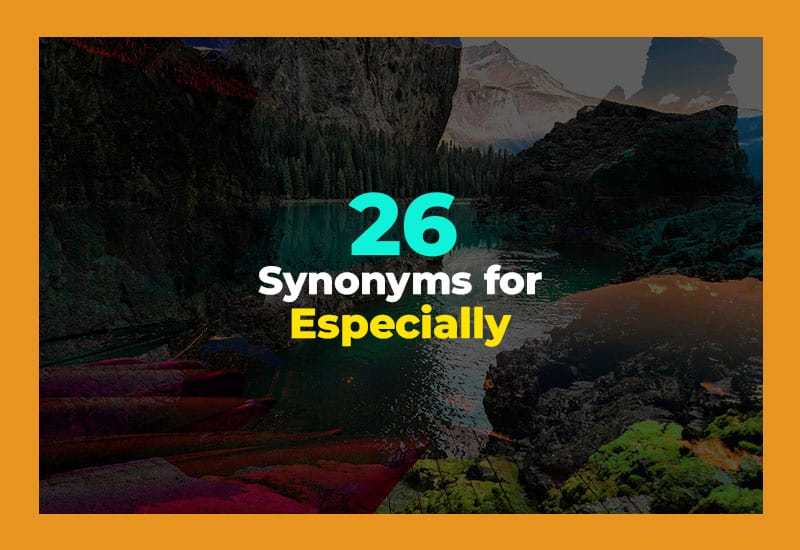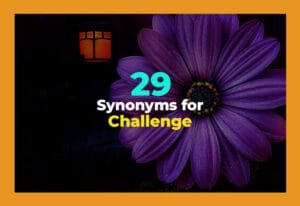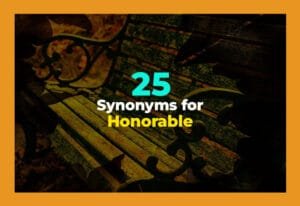You know that feeling when you want to highlight something important or give something a little extra attention? That's when "especially" comes in handy! But hey, using the same word over and over can get boring, right? So today, let's explore other fun and simple words that mean the same thing. You'll find these words super helpful in writing, speaking, and even texting. Whether it's "particularly" or "notably," you'll sound smarter and fresher just by changing it up. Let's make your vocabulary shine, especially (see what I did there?) with these awesome alternatives!
1. Particularly
"Particularly" is a great way to highlight one thing more than others. It helps you point out something special or more important in a group. For example, you can say, "I love fruit, particularly strawberries." It's a simple and friendly word that fits well in both casual and formal conversations. You can also use it in writing when you want to show focus or extra meaning. Whether you're talking about your favorite season or a part of a movie you enjoyed most, "particularly" is a clear and easy choice that works just about anywhere.
2. Notably
"Notably" is used when you want to draw attention to something specific or worth mentioning. It's a slightly formal word, but still very useful in everyday conversations and writing. "She is notably talented in painting and sculpture." This word shows that what follows is different or more important than the rest. It's great for listing achievements, facts, or anything that stands out. If you’re writing about history, science, or your friend's cool skills, "notably" helps point out what deserves a little spotlight. It's simple, elegant, and makes your ideas sound more thoughtful.
3. Specifically
"Specifically" is perfect when you want to be clear or exact about something. It helps explain that you're talking about one part or one thing in particular. For example, "I like movies, specifically action films." This word works well when you're narrowing down your thoughts or giving a clear example. It's useful in school, writing, or just chatting with friends. If someone's confused about what you mean, "specifically" helps fix that. It's a friendly, straightforward word that makes your message more focused and easier to understand.
4. Expressly
"Expressly" means something is done with clear intent or purpose. It's often used to say that something was clearly stated or done for a reason. For example, "This room is reserved expressly for guests." It has a slightly formal tone but is very powerful when you want to emphasize purpose. It's great for rules, instructions, or special messages. You might also see it in official signs or written instructions. Using "expressly" adds a touch of clarity and shows that there's no confusion about what something is meant for.
5. Chiefly
"Chiefly" means mostly or mainly. It tells people what the most important part of something is. "The movie was made chiefly for younger audiences." This word helps explain what something is really about or who it's meant for. It's great when you're discussing the main reason or purpose behind something. You can use "chiefly" in writing or speaking to sound smart and clear. It's a simple word that helps you get your point across when one part stands out more than the others.
6. Primarily
"Primarily" means the main reason or purpose for something. It's often used when something has different parts, but one is more important than the rest. "She works primarily from home." This word is helpful when explaining the biggest part of a plan, reason, or activity. It works well in school essays, casual talks, and even business conversations. "Primarily" helps you say what the focus is, so others understand exactly what you mean. It's a neat and smart way to show importance without being too fancy.
7. Principally
"Principally" means mostly or mainly, just like "primarily." It focuses attention on the most important part of something. "The team's success was principally due to their hard work." This word sounds a bit formal, so you might hear it more in writing than in casual speech. It's great for essays, reports, or when you want to sound a bit more serious. Still, it's easy to understand and helps you say what matters most. Use it when you're pointing out the main cause, reason, or person involved in something.
8. Markedly
"Markedly" means noticeably or clearly. You use it when there's a big difference or when something stands out a lot. For example, "His mood improved markedly after the vacation." It's a helpful word when you want to show change or contrast. If something changes in a strong or obvious way, "markedly" helps describe that. It's often used in writing or formal speech but is easy to understand in casual conversation too. This word makes your message stronger and helps people notice the difference you're talking about.
9. Decidedly
"Decidedly" means clearly or definitely, without any doubt. It helps make your point stronger. "The new design is decidedly better than the old one." When you're sure about something and want others to know it, "decidedly" is a good choice. It's like putting an underline or exclamation mark on your sentence. You can use it in both speech and writing to show confidence. Whether you're talking about food, style, or a decision, this word tells people you've made up your mind and there's no question about it.
10. Distinctively
"Distinctively" means something is unique and easy to recognize. If something stands out from the rest, this is the word to use. "She wears distinctively colorful clothes." It tells the listener that something is special and not like others. This word is often used when describing style, behavior, or features that make something noticeable. It helps add detail and brings a clearer picture to your sentence. If someone or something has a strong or unusual trait, using "distinctively" helps point that out in a friendly and descriptive way.
11. Preeminently
"Preeminently" means above all others or more important than the rest. It's often used when describing someone or something that leads the way. "She is preeminently known for her work in science." This word is more formal, so you'll usually see it in writing or speeches. It gives strong praise and shows that someone is the best or most important in a group. It's perfect for giving extra credit or showing respect. Use it when you want to highlight someone's top skills or greatest achievements.
12. Singularly
"Singularly" means in a unique or very special way. It's used when someone or something is different in a good (or sometimes bad) way. "He was singularly focused on winning the game." It adds power to your sentence and makes it feel more serious or intense. This word works well in both writing and speaking when you want to make something stand out. It's also great when you want to describe someone's strong effort or a one-of-a-kind trait. Use "singularly" when you want to sound more thoughtful and descriptive.
13. Exceptionally
"Exceptionally" means much more than normal, in a good or strong way. It adds extra praise to whatever you're describing. "She did exceptionally well on the test." It's a simple, popular word that makes your compliments even stronger. You can use it in school, work, or casual talks. This word is perfect when you want to show that someone or something is not just good, but truly amazing. Whether it's a person, a performance, or even a cake, "exceptionally" helps your words shine.
14. Outstandingly
"Outstandingly" is used to describe something that is really, really great. It shows high quality or amazing performance. "He performed outstandingly during the competition." It's a happy, positive word that makes everything sound more impressive. You can use it to describe people, work, effort, or anything that went above and beyond. It works well in both writing and speaking, especially when you want to give strong praise. Whether you’re writing a review or giving a speech, "outstandingly" is a word that adds sparkle and meaning to your compliment.
15. Strikingly
"Strikingly" means something grabs attention or stands out a lot. It's often used for appearance or big differences. "The painting is strikingly beautiful." It's a strong and elegant way to describe something that really catches your eye. This word adds power and emotion to your sentence, making the meaning more intense. You can use it for fashion, art, changes, or even ideas. If something makes a strong impression right away, "strikingly" is the perfect word to choose. It's expressive, easy to use, and helps your writing sound more colorful.
16. Importantly
"Importantly" helps you show that something matters a lot. It's often used to point out the big idea or most meaningful part. "Importantly, everyone arrived safely." This word fits nicely at the beginning of a sentence when you want to stress a key point. It's useful in both writing and speech, especially in news, essays, or instructions. "Importantly" tells the listener or reader to pay attention. When you're making a point or sharing something that should not be missed, this word helps you keep the focus strong and clear.
17. Vitally
"Vitally" means extremely important or essential. It often connects to things that are needed to survive or succeed. "It's vitally important to get enough sleep." This word is strong and serious, making it perfect for health tips, safety advice, or life lessons. It makes your sentence feel urgent and powerful. You can use it in school papers, speeches, or just to get your point across in a big way. When something is not just helpful but necessary, "vitally" lets your listener or reader know it truly matters.
18. Significantly
"Significantly" is used to show something has a big effect or is worth paying attention to. "His grades improved significantly this year." It helps describe changes, results, or impacts that matter. It's a great word for both casual and formal situations. Whether you're talking about improvement, differences, or results, "significantly" shows that it's not a small deal—it's something real and noticeable. It adds a little weight to your words and helps others understand that what you're saying is important. It's clear, helpful, and very easy to use.
19. Exclusively
"Exclusively" means only for one person, group, or purpose. It shows that something is limited or special. "This lounge is exclusively for first-class passengers." It adds a touch of importance and makes the subject feel more private or fancy. You can use it for places, offers, or anything made for just a few. It helps explain boundaries and rights clearly. Whether you're making rules or just pointing out something cool and limited, "exclusively" is a strong, simple word that says something is not for everyone.
20. Predominantly
"Predominantly" means mostly or mainly. It's used when something is the biggest or most common part. "The audience was predominantly teenagers." It's a smart-sounding word that's easy to use once you get the hang of it. You can use it in writing or speech to explain trends, groups, or features. It helps describe things that aren't 100%, but very close. It's useful in school, work, and even when talking about people, styles, or choices. If one part clearly stands out, "predominantly" makes your meaning sharp and clear.
21. Unusually
"Unusually" means something is not normal or is different in a surprising way. "It was unusually cold for a summer day." It's an easy word that helps point out changes, surprises, or odd moments. You can use it in all kinds of conversations—whether you're talking about weather, behavior, or events. It doesn't mean something is bad, just that it's not what you expect. It makes your message more interesting and keeps listeners curious. When things don't happen the usual way, "unusually" helps you tell the story clearly.
22. Mainly
"Mainly" means for the most part, or more than anything else. "We visit the park mainly to walk the dog." It's a super simple word that's great for everyday speech and writing. You can use it to explain the biggest reason for something without sounding too formal. It helps you focus your sentence and tell people what matters most. Whether you're talking about hobbies, goals, or plans, "mainly" keeps your point clear and your words friendly. It's a great choice when you want to explain what's most important in a group of ideas.
23. Centrally
"Centrally" means in the center or focusing on the most important part. It's useful for describing places or ideas that are in the middle of attention. "The museum is centrally located in the city." This word can be used in physical and abstract ways, like location or key themes. It helps people understand that something is easy to reach or deeply connected. Whether you're talking about geography or ideas, "centrally" keeps things focused. It's a helpful word that works well in travel, design, or storytelling.
24. Overwhelmingly
"Overwhelmingly" means in a way that is very strong or powerful. It's used when something happens with great force or in large amounts. "The vote passed overwhelmingly." It adds emotion and weight to your words. You can use it to show strong feelings, big support, or large amounts of something. It's perfect for results, reactions, or anything that goes far beyond normal. If something happens in a big way and you want to stress that, "overwhelmingly" is the word to use. It makes your point louder and stronger.
25. Emphatically
"Emphatically" means doing something with strong force or emotion. It's great when you want to show that someone feels strongly or means what they say. "She emphatically denied the rumor." It makes your sentence sound confident and serious. You can use it in writing or speech, especially in debates, speeches, or storytelling. It helps your words stand out and adds power to your opinions or feelings. When you say something with energy and no doubt, "emphatically" helps you deliver that message with a punch.
26. Vitally
"Vitally" means something is extremely important or necessary for success or health. "It's vitally important to drink enough water every day." This word adds urgency and seriousness to your message. It's useful when you're giving advice or stressing something that people really shouldn't ignore. You can use it in both formal and casual settings. It works well for topics like health, safety, and important decisions. "Vitally" tells others that what you're saying matters a lot and needs attention right away. It's a great word for serious and helpful conversations.

Final Thoughts
Learning different words for "especially" is a fun and easy way to improve your communication. These 26 synonyms help you sound clearer, smarter, and more confident. Whether you're writing an essay, telling a story, or just chatting with a friend, using the right word adds color and meaning. Try mixing them into your speech or writing—you'll be surprised how much more interesting your words become. From casual talk to formal writing, there’s a perfect synonym for every situation. Keep this list handy and make your language shine every time you speak or write.









